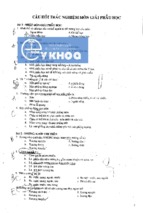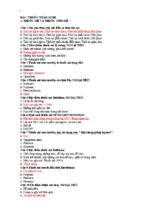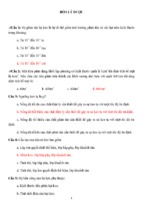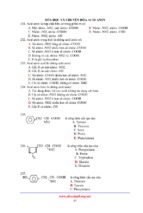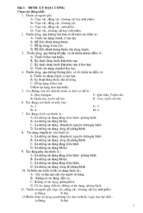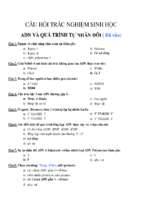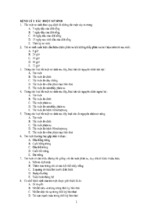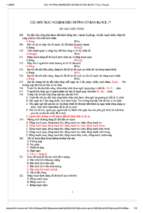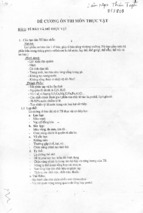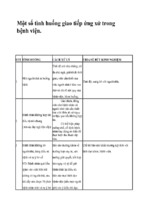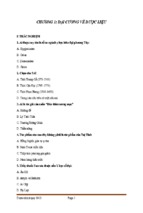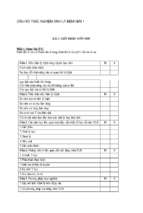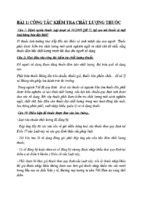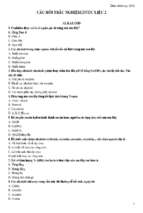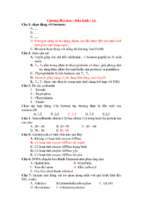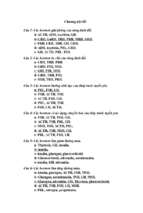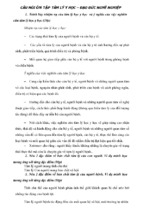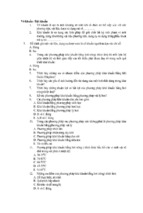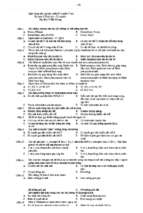Mô tả:
Dr Jill Watts, Registrar in Psychiatry is in the Doctors’ Sitting Room talking to Dr Bob Mason,
Senior House Officer in Medicine.
Dr Watts: Bob, I understand you’re on call today and I need your help with one of our
patients.
Dr Mason: What’s the problem, Jill? You don’t very often ask me to see your patients. It’s
usually the other way round. I ask you to deal with mine.
Dr Watts: I know, I’m sorry about giving you extra work, but I’m concerned about a 28-yearold lady of ours, Sarah Pringle, who is pyrexial and very confused.
Dr Mason: How long has she been on the ward?
Dr Watts: She was admitted about 8 days ago with what we think may be manic-depressive
psychosis.
Dr Mason: So how did you treat her ?
Dr Watts: Well, she was initially given intramuscular chlorpromazine followed by haloperidol
three times a day.
Dr Mason: Has that done any good?
Dr Watts: Yes, she certainly seemed to improve — until yesterday that is.
Dr Mason: What happened yesterday?
Dr Watts: The nurses on the ward noticed she was rather confused. Later in the day, she
complained that she was having trouble swallowing her food and this morning she’s
been incontinent.
Dr Mason: Is she epileptic?
Dr Watts: No, not as far as we know. The nurses certainly didn’t notice anything that
suggested she might have had a fit. The only thing they did mention is that another lady was
transferred to one of the other medical wards a couple of days ago for treatment of
pneumonia.
Dr Mason: Yes, that could be relevant. What’s her temperature today?
Dr Watts: It was 39.8 this morning. She’s sweaty and her pulse was 120 per minute with a
blood pressure of 160/100.
Dr Mason: Have any investigations been done?
Dr Watts: Yes, her white count is 16,000 with 75% neutrophils, her plasma sodium is 149
mmol/l and her urea is 12.5 mmol/l.
Dr Mason: It sounds as if she’s dehydrated.
Dr Watts: Yes, I think she probably is.
Dr Mason: Has she had a chest X-ray?
Dr Watts: Yes, and apparently it’s normal. We’ve tried to get an MSU. What else should we
have done?
Dr Mason: She probably needs blood cultures. Why don’t we get her moved to our ward as
soon as possible? I’ll have a look at her and see if we need to do any other tests.
Dr Watts: Good. I’ll get it organized immediately. She’s also had an ECG which I’ll send over
with her. We haven’t given her any antibiotics or anything else yet, but if you think it’s
necessary, well,it’s up to you. Is Dr Andrew around today?
Dr Mason: Yes. He’s going to do a ward round with me at five o’clock. I’ll make sure he
sees her.
Dr Watts: Good. Thanks for taking her.
Five hours later, Dr Mason is discussing Sarah Pringle’s case with consultant physician, Dr
Richard Andrew.
Dr Mason: I’m sorry I had to telephone you about this lady after I’d seen her this afternoon.
Dr Andrew: Don’t worry. You did the right thing. Could you just remind me of your findings on
neurological examination?
Dr Mason: She had moderate neck stiffness and quite marked cogwheel rigidity in all
four limbs. Kernig’s sign was negative, but the rest of the examination was unremarkable.
Dr Andrew: And you’ve done blood cultures and lumbar puncture as I suggested?
Dr Mason: Yes. The LP was normal. I’ve also got the results from some of the extra lab tests
you suggested.
Dr Andrew: Let me see. Ah! Her creatine kinase is 2000 units and she’s also got a slightly
high alanine transaminase at 120 units.
Dr Mason: So what does that all add up to?
Dr Andrew: Well, it’s still important to rule out any significant infection, and also to rehydrate
her. You mentioned she had complained of dysphagia yesterday and she’d been incontinent.
That,coupled with the psychiatrist’s having recently started her on phenothiazines,
suggests to me that she could have something called the neuroleptic malignant syndrome.
Dr Mason: Is that common?
Dr Andrew: Fortunately it’s quite rare. It’s seen with both the phenothiazines and the
butyrophenones such as haloperidol.
Dr Mason: Does it only occur soon after the drugs are started?
Dr Andrew: Yes, or when the dose is increased.
Dr Mason: Why do patients get dysphagia?
Dr Andrew: Dysphagia is quite a common dystonic symptom. Severe rigidity is often the first
sign of the neuroleptic malignant syndrome.
Dr Mason: Do the lab results fit with this diagnosis?
Dr Andrew: They certainly do. The elevated creatine kinase is particularly useful reflecting
the muscle damage caused by the marked rigidity. Myoglobinuria leading on to renal failure
can also occur.
Dr Mason: It all sounds very serious. What’s the prognosis?
Dr Andrew: Unfortunately there’s a high mortality rate usually caused by respiratory or
cardiac failure, aspiration pneumonia or the metabolic acidosis.
Dr Mason: Presumably we stop the neuroleptics…
Dr Andrew: Yes and she needs rehydrating.
Dr Mason: Shall we give her any bicarbonate?
Dr Andrew: We probably will need to, but we should assess her acid-base balance carefully
first. We can also give her intravenous dantrolene which prevents release of calcium from
the sarcoplasmic reticulum.
Dr Mason: Is it worth giving drugs like L-dopa or bromocriptine?
Dr Andrew: Yes, they can help in reducing the extrapyramidal rigidity and akinesia. We’ll also
need to watch carefully for any other problems and treat as they occur.
Dr Mason: How long before we will know if she’s recovering?
Dr Andrew: It could be about a week. Fortunately, she’s not on a sustained-released form
otherwise it could have been even longer. Let’s go and check how she is.
- Xem thêm -

